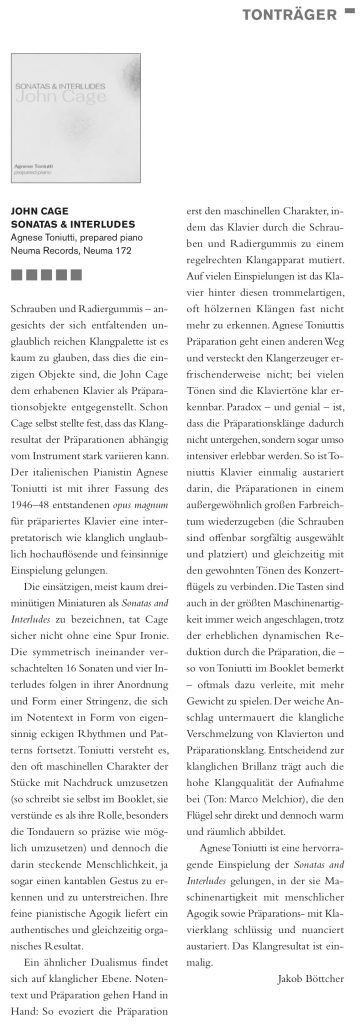June reviews from Germany
A couple of very nice reviews came from Germany this month: one on Glissando magazine about MaerzMusik performance in Berlin in March, the other published on the historical Schott music magazine Neue Zeitschrift fuer Musik (founded by Robert Schumann, it dates 1834).
Monika Zykla wrote an extensive review about all the events of MaerzMusik festival 2023 for magazine Glissando. That’s how she refers to Subtle Matters recital: “In the first part of the three-hour-long evening program titled Subtle Matters the Italian pianist and researcher, Agnese Toniutti, delivered a stunning solo piano recital that explored the sonic possibilities of the instrument „beyond its body” as described in the program. One of the highlights was Toniutti’s enthralling performance of Lucia Dlugoszewski’s four-part solo “timbre piano”4 composition, Exacerbated Subtlety Concert (Why Does a Woman Love a Man?) (1997/2000). This piece was juxtaposed with Tan Dun’s C-A-G-E, fingering for piano (1994), an homage to John Cage, and a selection of compositions for real and toy piano by the American composer Philip Corner. As in her solo album released in 2021 under the same title, Toniutti showed exceptional sensitivity and insight in her selection of the pieces. As a result, a fascinating dialogue emerged between Dlugoszewski and Dun’s compositions that further contextualized and situated Dlugoszewski’s music and aesthetics as part of the New York scene. It subtly referenced Dlugoszewski’s ambiguous and changing attitude towards John Cage as its most prominent and central figure which I read as a hint towards the question of why Cage’s silences were louder than the silences of others. Toniutti undertook an extensive body of research so that subtleties like this could surface and be signaled through music. Not to mention the amount of work she put into performing Dlugoszewski’s piece in the first place, despite the score being unavailable, as Toniutti explained in the program note.”
You can read the complete article here.
Jakob Böttcher reviewed Sonatas and Interludes for prepared piano by John Cage, released this spring on Neuma Records, on Neue Zeitschrift fuer Musik issue 2/2023.
Here is the English translation, and below the screenshot of the original review in German.
“Screws and erasers – in view of the unbelievably rich sound palette that unfolds, it is hard to believe that these are the only objects that John Cage opposes to the sublime piano as preparation objects. Even Cage himself noted that the sound result of the preparations can vary greatly depending on the instrument. With her version of the opus magnum for prepared piano, composed in 1946-48, the Italian pianist Agnese Toniutti has succeeded in creating an incredibly high-resolution and subtle recording, both in terms of interpretation and sound. Cage certainly did not call the one-movement miniatures, most of which are barely three minutes long, Sonatas and Interludes without a hint of irony. The symmetrically nested 16 sonatas and four interludes follow in their arrangement and form a stringency that continues in the musical text in the form of idiosyncratically angular rhythms and patterns. Toniutti understands how to implement the often mechanical character of the pieces with emphasis (she herself writes in the booklet that she understands it as her role to implement especially the tone durations as precisely as possible) and yet to recognize and emphasize the humanity, even a cantabile gesture, that they contain. Her fine pianistic agogic delivers an authentic and at the same time organical result. A similar dualism is found on the tonal level. The musical text and the preparation go hand in hand.
The preparation evokes the machine-like character, in which the piano mutates into a real sound apparatus through the screws and erasers. On many recordings, the piano is almost unrecognizable behind these drum-like, often wooden sounds. Agnese Toniutti’s preparation takes a different approach and refreshingly does not hide the sound generator; with many notes the piano tones are clearly recognizable. Paradoxical – and ingenious – is the fact that the preparation sounds are not drowned out by this, but can even be experienced all the more intensely. Thus, Toniutti’s piano is uniquely balanced in reproducing the preparations in an exceptionally wide range of colors (the screws are obviously carefully selected and placed) and at the same time combining them with the familiar tones of the concert grand. The keys are always softly struck, even in the most machine-like conditions, despite the considerable dynamic reduction due to the preparation, which – as Toniutti notes in the booklet – often tempts one to play with more weight. The soft attack underpins the tonal fusion of piano tone and preparation sound. The high sound quality of the recording (sound: Marco Melchior) contributes decisively to the tonal brilliance, which portrays the grand piano very directly and yet warmly and spatially. Agnese Toniutti has succeeded in making an excellent recording of the Sonatas and Interludes, in which she coherently and nuancedly balances machine-like and human agogic as well as preparation and piano sound. The sound result is unique.


